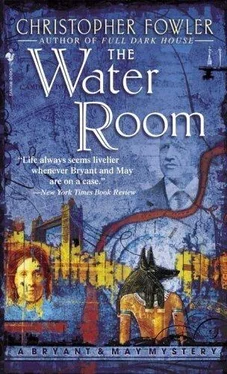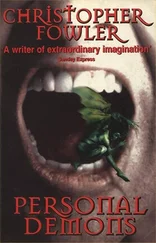Christopher Fowler - The Water Room
Здесь есть возможность читать онлайн «Christopher Fowler - The Water Room» весь текст электронной книги совершенно бесплатно (целиком полную версию без сокращений). В некоторых случаях можно слушать аудио, скачать через торрент в формате fb2 и присутствует краткое содержание. Год выпуска: 2006, Жанр: Детектив, на английском языке. Описание произведения, (предисловие) а так же отзывы посетителей доступны на портале библиотеки ЛибКат.
- Название:The Water Room
- Автор:
- Жанр:
- Год:2006
- ISBN:нет данных
- Рейтинг книги:5 / 5. Голосов: 1
-
Избранное:Добавить в избранное
- Отзывы:
-
Ваша оценка:
- 100
- 1
- 2
- 3
- 4
- 5
The Water Room: краткое содержание, описание и аннотация
Предлагаем к чтению аннотацию, описание, краткое содержание или предисловие (зависит от того, что написал сам автор книги «The Water Room»). Если вы не нашли необходимую информацию о книге — напишите в комментариях, мы постараемся отыскать её.
The Water Room — читать онлайн бесплатно полную книгу (весь текст) целиком
Ниже представлен текст книги, разбитый по страницам. Система сохранения места последней прочитанной страницы, позволяет с удобством читать онлайн бесплатно книгу «The Water Room», без необходимости каждый раз заново искать на чём Вы остановились. Поставьте закладку, и сможете в любой момент перейти на страницу, на которой закончили чтение.
Интервал:
Закладка:
‘Sounds right up my street,’ said Bryant with a sly grin.
27. THE MOVEMENT OF WATER
‘Darned shame about the weather,’ said Oliver Wilton earnestly. ‘You’ve missed seeing the Camden Canal Junior Canoe Club in action.’
John May waited beneath a willow tree while Oliver and his wife buttoned up their yellow plastic cagoules. A pair of tramps were arguing over a can of Special Brew on the bench behind them. Another was eating Spam out of a tin with his fingers. The canal water was studded with chunks of polystyrene, the linings from boxes of stolen stereo units. Even the birds in the trees looked as if they had cancer.
‘Your neighbour, Jake Avery, said I’d find you here or at the Christian Fellowship Hall.’
‘We like to do our bit at the weekends,’ Oliver told him, padlocking the club shelter. ‘The local kids haven’t really learned how to interact socially with one another, and we find that activities like canoeing, away from the council-estate environment, encourage teamwork.’ He looked as if he believed what he was saying.
‘Does Brewer enjoy canoeing?’ asked May, smiling at the morose child sitting on his ankles at the water’s edge.
‘God, we wouldn’t let him do it, the water’s filthy,’ Tamsin replied. ‘You can get Weil’s disease from rat urine.’ She grabbed the child’s hand protectively. May could see that one day very soon, Brewer would not allow his hand to be taken up so quickly. ‘He’s saying, “I want to go home, Daddy, I’m tired,” aren’t you, pet? We usually go to the house in Norfolk at the weekends, but Oliver likes to put something back into the community.’ The effort to smile nearly killed her. ‘I wanted Brewer to grow up in the countryside, but Oliver insisted we stay in town until it’s time to go to big school.’ She lowered her voice. ‘A nurse was raped on this towpath last month. A nurse . Shoved off her bicycle into the bushes. The police won’t come down here.’ It was difficult to miss the desperation in her eyes. She hated Oliver for imprisoning her in the city. ‘I’m from Buckinghamshire originally, and I can tell you, Mr May, this is not like home, not what I call home.’
She turned and began leading the boy away, so that May was forced to follow. Oliver doggedly fell in behind them, in what May took to be a permanent state of disgrace with his wife. Ahead, several pigeons blocked the path, dining from a spattered pool of sick.
‘My work keeps me here,’ Oliver explained.
‘What do you do?’ asked May.
‘I thought you knew.’ He seemed surprised. ‘I’m a senior executive at the Thames Water Board. You have no idea how much water London wastes through leaks each week. My job is to help locate them and replace the damaged pipes. Why did you come and find us?’
‘I wanted to ask you about-’ He had been about to say ‘Elliot Copeland’, but something made him change-‘Mrs Singh. I know the matter is concluded, as far as the authorities are concerned, but I wondered if you had any personal thoughts.’
‘It’s funny you should ask. I’d been thinking of what your partner said at our party, about her drowning in her own house. It struck a distant chord, I just couldn’t put my finger on it at the time.’
‘Oh? In what way?’
‘It sounds silly, but-darling, I think Brewer’s tired, could you take him home? I’d like to take Mr May to my office and show him something.’
The innocuous steel building on Canal Walk did not look like the headquarters of a water board. Apart from a guard reading the Sun in the reception area, the place was empty. ‘Oh no, it’s not here,’ laughed Oliver. ‘This is a temporary on-site venue, somewhere we can plug in our laptops and hold meetings. It’s a fascinating business. I can give you a potted history, although I don’t see how it will help.’
‘I don’t mind,’ said May casually. ‘I’ve a little time to kill.’
Oliver led the way to a bare office of maroon carpet tiles and plan chests. ‘Well, it goes back to a chap called Hugh Myddleton who created the New River, which we think was the world’s first Build-Own-Operate project, a channel carrying water from springs in Hertfordshire to Islington. It became operational at the start of the seventeenth century; it’s still partly in use today.’ He pushed over a chair. ‘Make yourself comfortable.’
May seated himself. ‘So a London water board has been around since then?’
‘We were needed from the outset. The huge influx of people from rural areas increased pressure on the water supply, but we had the steam engine and cast-iron piping to improve things. Of course, there was a terrible rise in waste. Indoor plumbing was nonexistent. Chap called Harington invented the first indoor toilet in the 1590s, but it wasn’t widely adopted because there was no supply of running water to flush it. Cesspits were an advance, but they weren’t emptied very often. Now, I know it’s here somewhere.’ He pulled out a drawer and began leafing through the plans. ‘The Thames was the main source of drinking water for London, and remained pretty clean until around 1800, even supporting a decent fishing industry. You could catch lobsters and salmon in its reaches. Unfortunately, it didn’t last because not enough cesspits had been built. Residents started illegally connecting their overflows to surface drains and underground rivers flowing into the Thames. The rising tide of sewage destroyed all life in the water and it began to smell, especially in hot weather. I’m sure you’ll have heard of the Great Stink of June 1858, when the stench became so lethal that no one could work inside Parliament. The cholera epidemic killed two thousand Londoners a week until Dr John Snow discovered it was spread in water, and closed the infected pump in Golden Square. The John Snow pub in Broadwick Street is dedicated to him.’
‘Didn’t Bazalgette come up with a plan to build sewers?’
‘Yes; a pity so many people had to die before Disraeli could be convinced to implement the system. It’s an incredible piece of engineering, a series of cascades that race around the city washing everything away. After that came chlorination during the First World War, then double filtration and new steel water mains.’
‘What about these days? I mean, where does all the waste go?’
‘North London’s waste goes to Abbey Mills Pumping Station in Stratford, and an outfall sewer takes it to the treatment plant at Beckton. South London’s goes to Deptford, and from there to works at Plumstead.’
‘And what happened to the underground rivers?’
‘Some were turned into sewage outlets, but most were difficult to drain after centuries of abuse. If you block up a river, the water still collects and has to run off somewhere. Houses are getting wetter again. The water table is rising due to climate changes, and the old rivers are on the move once more. But using them became redundant in 1994, when we opened the capital’s underground ring-road, which allows water to circle the streets of London. It’s one of the secret wonders of the world.’
‘Is it big enough to climb inside?’
‘Well, it has a diameter of two and a half metres, but it’s pretty full. The Thames is now the cleanest metropolitan river on the planet, and supports 120 species of fish. We’re servicing forty-six countries across the world. It’s a damned big business. I could tell you about our sludge-incineration programme, but I fear I’d bore you.’
You’re right there, thought May. ‘Forgive me for asking, Mr Wilton, but what has this to do with Mrs Singh?’
‘I’m sorry, I tend to get carried away. Tamsin doesn’t like me bringing drains to the table, so when I find a fellow enthusiast. . Ah, I think this is it.’ He pulled open another map drawer and tugged at a vast yellow sheet covered in dense, poorly printed lettering. ‘This was made in the fifties. It’s the last remotely accurate assessment of London’s missing tributaries and outlets, produced by the LCC, but parts of it are missing, or the courses have shifted. They need to be tracked because there are so many electrical cables and tunnels under the streets. London doesn’t operate on overhead systems. How do you track something that keeps moving? The truth is, we can only measure soil humidity and hope for the best. Look at what happened in Blackheath a couple of years ago-the roads simply caved in without any warning.’ He traced his forefinger along the route of the Fleet. ‘When rivers change course, strange things happen. If you don’t know there’s a river underneath, you might be inclined to start believing in ghosts.’
Читать дальшеИнтервал:
Закладка:
Похожие книги на «The Water Room»
Представляем Вашему вниманию похожие книги на «The Water Room» списком для выбора. Мы отобрали схожую по названию и смыслу литературу в надежде предоставить читателям больше вариантов отыскать новые, интересные, ещё непрочитанные произведения.
Обсуждение, отзывы о книге «The Water Room» и просто собственные мнения читателей. Оставьте ваши комментарии, напишите, что Вы думаете о произведении, его смысле или главных героях. Укажите что конкретно понравилось, а что нет, и почему Вы так считаете.












